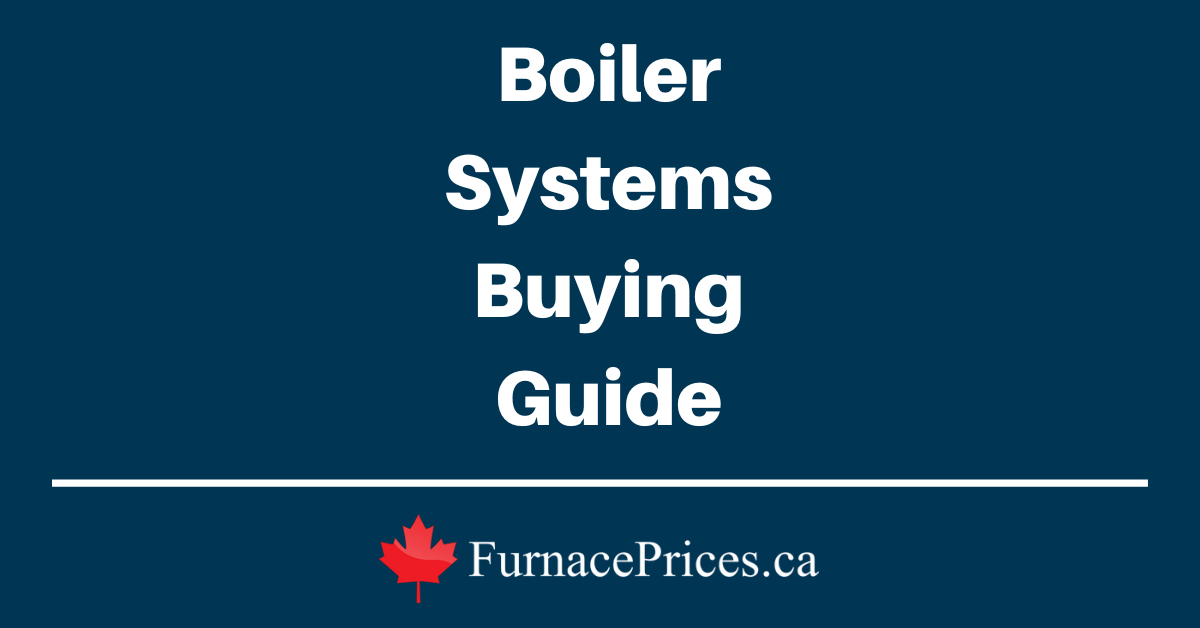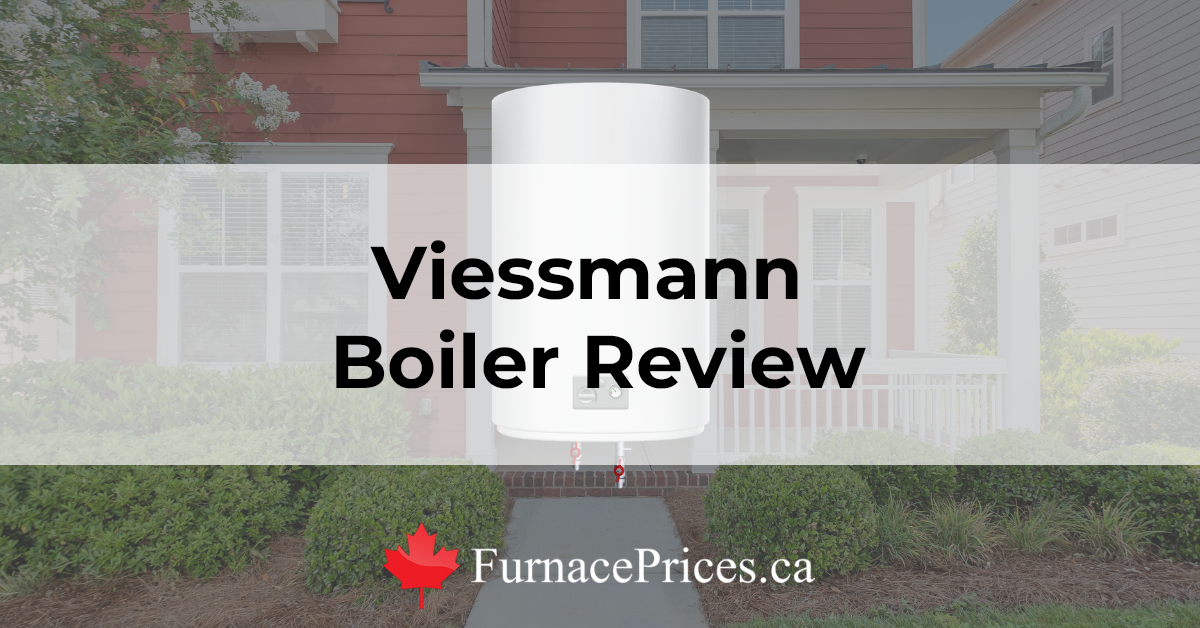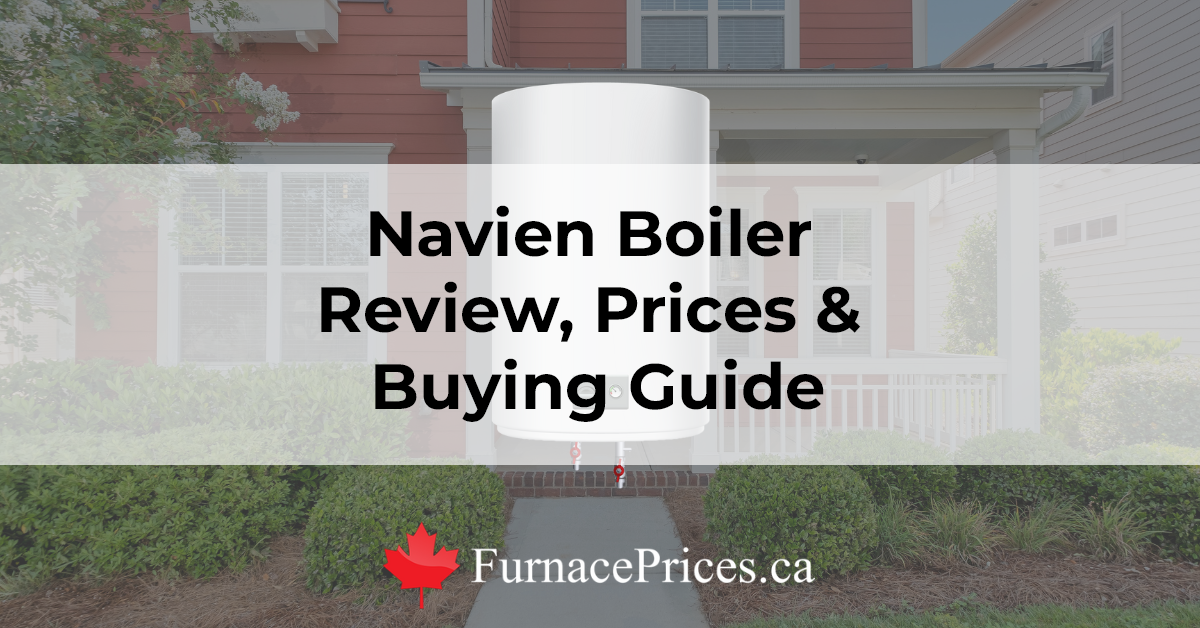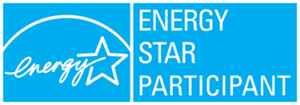We review and compare the best boilers in Canada (including combi boilers) for 2025 to help Canadian homeowners and businesses choose the right hydronic heating system.
Home heating is always a major concern for Canadians, no matter what city or province you live in. Around 10 percent of Canadian homes are heated with boiler systems, which circulate hot water through pipes in the house to heat your home.
Older boilers tend to be louder and less efficient than newer ones. By 2025, all gas boilers and combi boilers sold in Canada will have an efficiency rating of at least 90%, so upgrading could save you a great deal of money on heating costs compared to an older boiler.
To help you choose the right system, Furnace Prices has compared some of the best boilers in Canada and evaluated them based on things like price, features, efficiency, warranties, and more. This guide will review the best boilers and combi boilers in Canada to help you decide which boiler system is best for your home, your needs, and your budget.
How We Evaluate the Best Boilers in Canada
Evaluating the best HVAC equipment is about more than just comparing the most popular brands and the cost for different models. Getting the right boiler can save you time, money, and headaches in the long run, even if you have to pay a little more upfront.
Here are just a few of the things we examine when reviewing the best boilers in Canada:
- Installation considerations, such as simplicity, costs, and mounting options
- Energy efficiency (a higher AFUE means lower operating costs month after month)
- Features and technologies that improve performance, durability, and operation
- The type of boiler system (such as conventional or combi)
- The warranty that comes with the boiler
- Material and construction quality
- Cost versus value
- Condensing versus non-condensing systems
Conventional Boilers Versus Combi Boilers
Combi boilers are on-demand systems that heat the water for your cooking, cleaning, and bathing needs while also providing the hot water for the boiler system, so you get heat and hot water from a single system.
While not as common as conventional boilers, combi boilers are becoming more popular because they have multiple benefits, such as:
- You don’t need a separate system for heating and domestic hot water
- You only have to buy one appliance, which can save money
- Cheaper installation compared to installing two appliances
- The units take up less space
- The best combi boilers are highly efficient
The Most Affordable Boilers in Canada
Boilers can be a major investment, but a good one will last upwards of 20 years.
In general, a new boiler unit could run anywhere from $1,200 to $5,000+, and that doesn’t include installation. With installation, a combi boiler will cost an average of $3,500 to $10,000+, and a conventional boiler could cost $5,000 – $10,000+ or more.
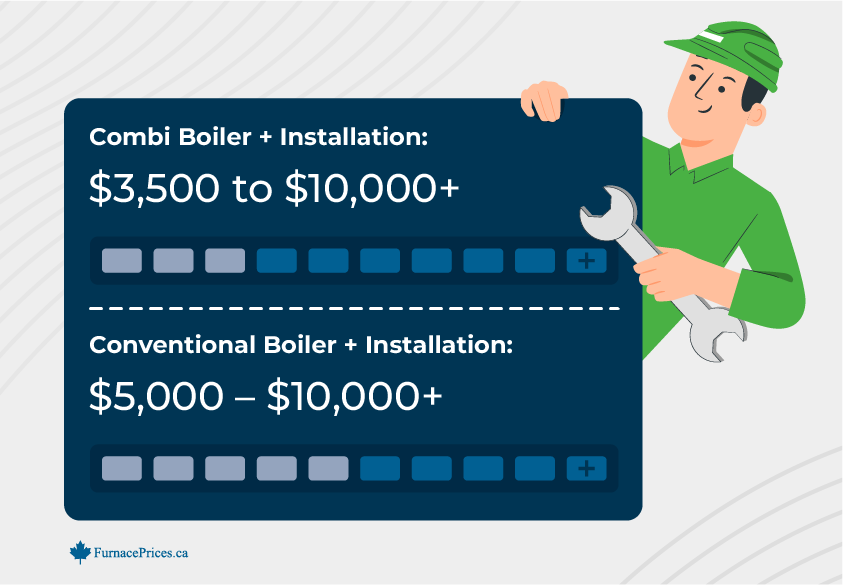
Other than installation, the major factors that will impact the cost of a new boiler include the fuel type, capacity, whether it’s a conventional/combi/condensing unit, efficiency, additional technologies, warranty, and more. Larger and more energy-efficient boilers will generally be the most expensive.
For example, condensing boilers tend to be among the priciest boilers because they have high-efficiency ratings and large capacities.
Here’s a list of some of the most affordable boilers in Canada right now:
| Brand | Price Range (not including installation) | Affordable Model/Series | Boiler Type | Output (Btus) |
|---|---|---|---|---|
| Slant/Fin | $1,600 to $2,600 | Sentry | Conventional | 34,000 to 150,000 |
| Navien | $2,200 to $2,500 | NHB-55 | Condensing | Up to 55,000 |
| Rinnai | $2,400 to $2,700 | i060CN | Condensing combi | 15,000 to 60,000 |
| Bosch | $2,600 to $3,200 | Buderus GC144 | Conventional | 74,000 to 132,500 |
| Viessmann | $3,000 to $4,000 | Vitodens 100-W | Condensing | 21,000 to 125,000 |
| Rinnai | $2,700 to $3,000 | i090SN | Condensing | 90,000 to 120,000 |
Get Quotes
How soon are you looking to buy?*



Boilers with the Best Warranty Coverage
Warranties aren’t always something Canadians pay much attention to, but when it comes to HVAC equipment, a good boiler warranty can be worth its weight in gold. All new boilers sold in Canada must come with at least a basic warranty, but some manufacturers go above and beyond when it comes to standing behind their products.
The best warranties tend to come with higher-priced boiler systems, but that’s not always the case. A good warranty could save you hundreds or thousands of dollars in repairs and maintenance, so you’ll want to pay attention to the warranty offered with any new boiler.
Here are the best boiler warranties offered in Canada right now:
| Brand and Model/Series | Boiler Type | Parts | Heat Exchanger | Prorated beyond 10 years? | Labour |
|---|---|---|---|---|---|
| Navien NHB Series | Condensing | 5 years | 10 years | Yes, until year 15 | 1 year |
| NTI TRX | Conventional | 5 years | 10 years | Yes, until year 15 | N/A |
| Rheem Prestige | Combi | 5 years | 10 years | No | 1 year |
| Rinnai (all models) | Combi and conventional | 5 years | 12 years | No | 1 year |
| Bosch Greenstar | Condensing | 5 years | 10 years | Yes, until year 15, then 25 percent lifetime coverage | N/A |
| Slant/Fin Galaxy, Victory, Sentinel, Sentry | Conventional | 1 year | 10 years for all cast iron components | Yes, until year 25, then 25 percent lifetime coverage | N/A |
| Baxi (all condensing models) | Condensing | 5 years | 15 years | No | N/A |
| Ideal Exalt, Gallant, Exalt combi | Condensing and condensing + combi | 6 years | 12 years | No | 3 years |
| Triangle Tube Instinct Combi | Combi | 6 years | 10 years | No | 3 Years |
Boilers with the Best Features
Boiler systems have been used to heat spaces for over 150 years, and the systems have come a long way since the first designs were patented. The best boilers in Canada today are far quieter and more efficient than ever before.
Further, some manufacturers are also developing features that enhance performance, increase longevity, reduce the unit’s environmental impact, make their boilers easier to control, and more.
For instance, one feature that many modern boilers offer—have a look at the Rheem Prestige for an example—is an outdoor temperature monitor and reset function, so the boiler will automatically adjust the indoor temperature based on the outdoor temperature.
Beyond that, here are some of the best models on the market that have additional features and technologies you might appreciate:
Boilers with Great Turndown Ratios
A turndown ratio is the difference between the boiler operating in full-fire mode versus its lowest operating mode before shutting off. A boiler with a higher turndown ratio can operate at lower capacities to save energy and maintain the ideal temperature.
These are some of the boilers with great turndown ratios:
- Westinghouse Premier: 10:1
- Navien NHB: 15:1
Boilers with Green Features
- Daikin’s Altherma series boilers can be connected to solar power generation systems.
- Westinghouse’s Premier boiler promises extremely low nitrogen oxide emissions.
- Baxi’s THINK combustion management system monitors and tweaks the gas/air mixture in the system to reduce gas consumption and improve performance.
- Noritz’s NRCB combi boiler meets rigorous emission standards thanks to the fully modulating burner.
Boilers with Longevity and Durability Features
Modern boilers have an average lifespan of 15 to 20 years, but some manufacturers try to increase longevity and durability with features like:
- Chemical-resistant metal section connectors from Rand and Reardon
- A freeze protection safety device from Baxi
- Built-in two-stage frost protection with the Vaillant ecoTEC Plus combi
- MatriX-Plus burner with stainless steel MatriX surface on the Viessmann B2KB Vitodens 200W
- Corrosion-resistant primary and secondary heat exchangers on the Noritz NRCB combi
Boilers with Quiet Operation Features
- Vaillant’s ecoTEC Plus combi has a special flame lift detection system for quiet combustion
- Viessmann’s Vitodens 200-W has a low fan speed for quiet operation
- Rand and Reardon boilers have a step-opening gas valve for quiet startup
Boilers with Convenient Control and Enhanced Performance Features
- Navien NHB condensing boilers are controlled with the NHB Integrated control, which allows you to easily adjust heat capacity, the outdoor temperature reset, the turndown ratio timing, and more
- Navien NCB-E series combi boilers and NHB & NFB boilers have the option of a magnetic filtration system called NaviClean
- Daikin Altherma series boilers are monitored by the Daikin Eye for optimal performance
- Viessmann Vitodens 220-W has a user-friendly control system that lets you monitor and control settings and performance
- Many boilers can be controlled wirelessly from a smartphone or tablet, including:
- The Vaillant ecoTEC Plus Combi
- Bosch Greenstar boilers
- Baxi 800 Platinum Combi
- Viessmann Vitodens 200-W
- Navien through their NaviLink system
Most Efficient Boiler Systems
The more efficient your boiler is, the less it will cost to heat your home (and maybe your hot water) every year. A boiler with a high annualized fuel utilization efficiency (AFUE) rating will typically cost more, but you will recoup that cost over the months and years thanks to the lower energy bills.
Home heating is one of the largest expenses you have as a homeowner, so buying a more efficient boiler will pay off in the end.
AFUE measures how much heat is transferred from the boiler to the water versus how much is lost during the heating and transferring process. The higher the AFUE, the less energy is lost, and the less it will cost to heat your home. You can also look for the ENERGY STAR logo, which guarantees that a gas boiler uses 10% less energy than a standard boiler.
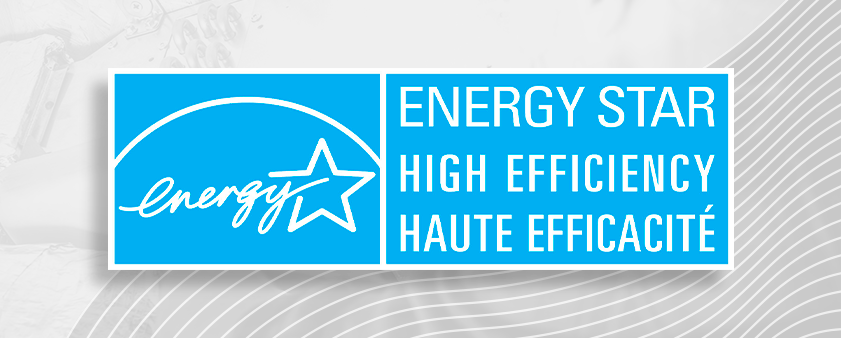
Older boilers can have AFUE ratings as low as 50 percent, and that means 50 percent of the energy is being wasted. By comparison, modern high-efficiency boilers have AFUE ratings between 90 and 98 percent, meaning as little as 2 percent of the energy is wasted.
Condensing boilers are among the most efficient because they recycle the heat from water vapor in the system, so they require less energy to preheat cold water coming into the boiler.
Because of this design, condensing boilers use more of the energy they draw and have lower operating temperatures, making them more efficient overall. That’s not to say that non-condensing boilers can’t be energy efficient.
Let’s look at some of the most efficient boilers on the market:
| Brand/Model | AFUE (%) | Boiler Type | Output (Btus) |
|---|---|---|---|
| Triangle Tube Prestige Solo | 95 | Condensing | 80,000 to 399,000 |
| Navien NHB series | 95 | Condensing | 55,000 to 150,000 |
| Rinnai E110SRN | 95.5 | Condensing | 26,000 to 110,000 |
| Bosch Buderus SSB | 96 | Condensing | 85,300 to 255,000 |
| Westinghouse Premier | 96 | Conventional | 80,000 to 399,000 |
| IBC HC | 96 | Condensing | 13,500 to 160,000 |
| NTI GF200 | 97 | Combi | 19,900 to 80,000 |
| Viessmann Vitodens 2222-F | 98 | Condensing combi | 67,000 to 125,000 |
Boilers with the Easiest Installation
While ease of installation might not be something you really care about when you pick out your boiler, there’s one reason why you might want to give this some thought: it can impact the installation cost. In general, the easier a boiler system is to install, the more you’ll save on labour costs for an HVAC expert.
Boiler installation can cost anywhere between $1,000 and $4,000, depending on factors such as:
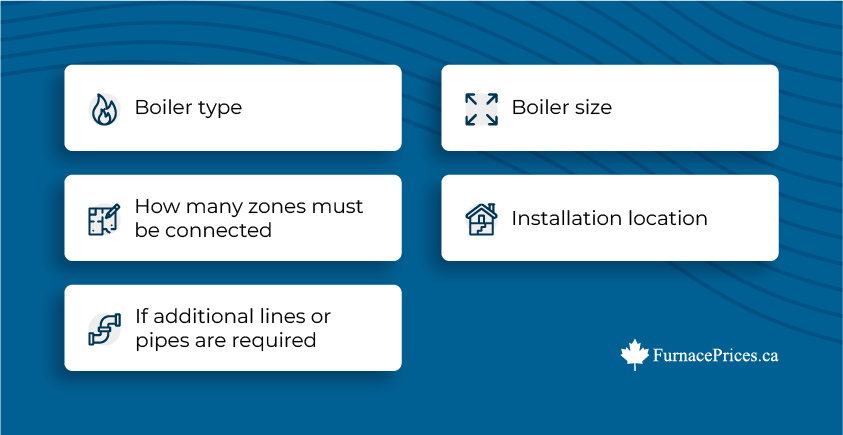
- Boiler type
- Boiler size
- How many zones must be connected
- Installation location
- If additional lines or pipes are required
Because installation can be such a large cost, quite a few boiler manufacturers have started focusing on improving ease of installation by making their boilers more compact, lighter, and less complex to hook up. Here are some examples of boilers that have been designed for quicker and easier installation:
- Daikin Altherma series boilers: all parts are accessible from the front of the unit, making installation faster and easier, and the compact size means it can be installed in small spaces, such as cupboards
- Baxi’s 800 Platinum Combi boiler is lightweight and compact, and has front access for quick and simple maintenance
- Vaillant’s atmoTEC, ecoTEC, and turboTEC Plus boilers come with a pipe cut-out and adjustable wall bracket for fast installation
- Slant/Fin’s Victory VHS Series boilers have contractor-friendly features that promise fast installation and maintenance, and they don’t require a chimney, which increases installation choices
- Bosch Greenstar boilers are designed for fast installation and to be low maintenance
- NTI’s Vmax series boilers are equipped with down-fired fire tube stainless steel heat exchangers that make installation and service quicker and easier
- Ideal’s Vogue Max combi boiler is lightweight and compact for faster installation
- Rheem’s Prestige boilers have been designed with low installation costs in mind, and have low-cost and easy-to-install venting
Getting the Most from Your Boiler System
You could buy the best boiler in Canada or the top combi boiler and still have problems if you don’t get it installed professionally.
A professional, trained, and certified HVAC technician will make sure your boiler is the right size, that it’s installed properly, that it doesn’t get damaged in the process, and that it’s working as efficiently as possible.
A professional installer can also help you with tips like insulating the pipes, bleeding the air, checking the pressure, and cleaning the radiators, which will all improve efficiency and performance.
After that, annual inspections and maintenance are also important for the efficient operation and long life of your boiler. Plus, regular maintenance will help to prevent major breakdowns that could be very costly to fix.
Again, you’ll want to use a trained and certified HVAC expert for all inspections, maintenance, and repairs, otherwise you could do more damage than good for your boiler.
Not sure how to find a trustworthy local contractor who has all the credentials? Not to worry. That’s what the Furnace Prices independent contractor certification program is for.
We vet the HVAC professionals in your neighbourhood so you don’t have to. When you use a certified partner through our program, you can be confident you’re geting a professional contractor who has the tools, insurance, licenses, certification, education, and experience required, and that you can trust to get the job done right.
FAQ
Can my boiler heat and cool the way a heat pump can?
In short, no. Hydronic systems are similar to boiler systems in that they use water circulated through pipes and radiators to control indoor temperature. Hydronic systems do have the ability to cool spaces because they have chilled water tanks and a separate system of pipes for the cold loop. Residential boiler systems, however, don’t have the cold water tank and separate chilled loop, so they can’t provide cooling in the summer.
When should I service my boiler?
Boilers are like furnaces and air conditioners in that you should have them inspected and maintained once a year by a trained and licensed HVAC technician. This will help keep your boiler system in optimal shape for as long as possible, and keep it working efficiently.
What’s the best boiler brand?
The same way that Buick, Cadillac, and Chevrolet are all owned by the same parent company, General Motors, so too are many HVAC brands owned by a handful of manufacturers. Therefore, you should put more weight on things like price, warranties, efficiency, and the other factors discussed here when you’re buying a boiler. That being said, there are some brands that are more popular than others in Canada, and they include Navien, Viessmann, NTI, Rheem, Rinnai, and Bosch.
How do I choose the best boiler for my house?
Start by figuring out your budget and determining the fuel source. If you’re replacing an older boiler, it will be easier and cheaper to stick with the same fuel source. However, it might be worthwhile switching fuel sources if you want to get rid of an expensive electric boiler or an inefficient oil boiler. Then, determine if you want a conventional boiler or a combi boiler that can give you heat and hot water. No matter what style you need, you will also have to figure out the capacity and output.From there, determine the efficiency rating you want and can afford, factoring in the cost savings of a higher efficiency unit into your budget. Make a list of the features you’re looking for, and then compare the different boilers that meet your needs, paying attention to things like warranty terms and installation costs as well. If you’re having trouble deciding, a certified HVAC professional will be able to assess your needs and help you choose.
When should I replace my boiler?
Once a boiler gets over the 10- to 15-year mark, you should consider upgrading it, especially if it’s requiring more maintenance and repairs than it was in the early days. A good rule of thumb is this: if repairing the boiler will cost more than 50 percent of what you’d pay to replace it, then you should replace the boiler. But before doing that, always check your warranty terms to see if any parts or major components are still covered, because you might be able to get away with a lower-cost repair.
Explain furnaces vs boilers?
A furnace uses a heat exchanger to heat air. The system then pumps that air around the house to raise the indoor temperature. A boiler system uses a heat exchanger to heat water. The system then pumps the hot water to radiators, air handlers, or an in-floor radiant heating system. The heat is then transferred to the air, raising the indoor temperature.
Are there government rebates for boiler systems?
Yes! Programs available through municipal, provincial, and federal governments sometimes have boiler rebates available. Check out the full list of current government rebates.
Get Quotes
How soon are you looking to buy?*






